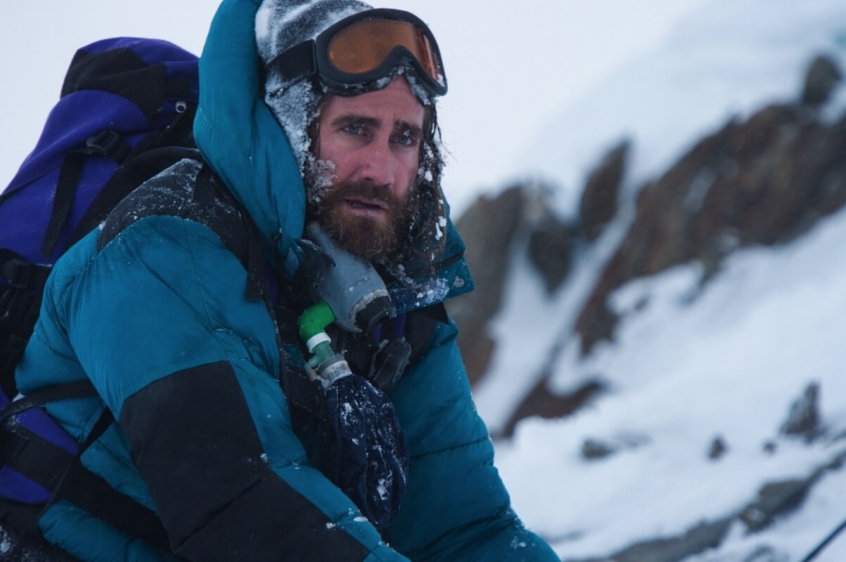
What do you do when you're casually climbing a 30,000ft mountain, and then things start to go wrong? It's the universally recognisable issue at the heart of Everest, the official film of the world's tallest, scariest and most famous mountain.
Okay, so most of us will probably never find ourselves trekking up that snowy Nepalese rock; fewer still after this movie has been widely seen. Yet Everest manages to make its unique setting remarkably relatable, and it achieves other impressive feats too. It makes you care about a group of rich people who've found a novel and sado-masochistic way of spending their fortunes, and it manages to makes a film about mountaineering utterly compelling.
Avoid the details of the plot if at all possible. The bare, spoiler-free bones of the story are as follows. In 1996, New Zealander Rob Hall (Jason Clarke) is at the forefront of an emerging tourist industry that takes amateur climbers to the summit. His cohort, each member of which pays $65,000 for the privilege of joining him, is just one among many, as 20 different climbing entrepreneurs throw themselves into the apparent gold rush of extreme tourism. Clarke is outstanding and hugely likeable in the lead role, banishing thoughts of his turn in Terminator: Genisys with a heroic performance, while Jake Gyllenhaal is reliably excellent as the rival climber with whom he joins forces.
The early stages of the film are a charming ode to companionship. Kiera Knightley and Emily Watson make mainly-decent fists of their Kiwi accents, and there's the most fabulous use of a Crowded House song in a mainstream cinematic release (a joke which only makes sense once the story has unfolded). But on Everest of all places, the warm fuzziness can't last forever.
So Rob's group, like all the others, sets off on the long climb up Everest. Drama inevitably unfolds, but what makes us care – thanks to William Nicholson and Simon Beaufoy's powerful script – is the relationships between individuals. Once the climbing begins however, the commercial competition begins to die away; as one character points out: there's enough rivalry for each person between them and the mountain. What begins as common purpose and develops into friendship is transformed under pressure into community. Against the awesome and unforgiving backdrop of the mountain (the film's silent central character), unity is forged in a group of people who not only want to get up and down in one piece, but who are genuinely driven to see each other succeed too.
As the danger increases, the characters demonstrate tremendous moral courage, acts of submission and even self-sacrifice. They're compelled to act even when they do so at great personal risk; they value each other's lives as highly as their own. Jesus' famous idea about love and friendship, that it is seen most purely in the laying down of one's life for one's friends, seems recurringly apt throughout.
The resonance of this central theme is perhaps why it's so hard not to care about a group of people who've chosen to put themselves in such extreme danger. In a culture of individualism, we're conned into thinking that we're the most important people in the world; that everyone else comes second to us. Everest's 'leave no-one behind' heart feels like a much worthier way to approach life, whether that happens to be on the side of a deadly mountain, or standing at the school gates alongside lonely fellow parents; or in the water-cooler queue with someone who's bottling up their personal struggles. The film makes a strong case for a culture of relationship and community, where the individual comes second, and everyone gets a chance to thrive as a result.
As a Christian, and as a part of a fragmented church which is so often at war (or grumpy disagreement) with itself, Everest felt like a fine metaphor. The film shows us a group of people who have recognised that the size, scale and danger of the task ahead of them is so great that it cannot be overcome alone. Not only that, but they realise that they benefit from one another's flourishing. It made me wonder why we don't see the Body of Christ in the same way; it made me imagine how things might be different if we truly did put one another first; if we really did put our hopes in one another's achievements, instead of so constantly tripping ourselves up on comparison and competition.
Go and see Everest. See it on a big screen if you possibly can. It's a thrilling, exhausting ordeal of a movie; in it's own small way a feat of endurance even. But it is quite brilliant. At the end of my screening, cinema-goers stood up and hugged one another. It's the obvious reaction to a movie that makes you so glad of friendship and community. As a thousand sermons are bound to point out in the months that follow, it leaves you yearning for more of both.
Martin Saunders is a Contributing Editor for Christian Today and the Deputy CEO of Youthscape. You can follow him on Twitter: @martinsaunders













